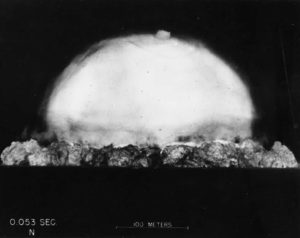
Manhattan Project: Code Name “Trinity,” Trinity Site, Alamogordo Bombing and Gunnery Range, N.M., July 16, 1945, 53 milliseconds after detonation.
Based on the amount of news coverage, you may not have heard of it, but on July 7, 2017, the United Nations adopted the Nuclear Prohibition Treaty. The agreement bans the use of nuclear weapons, and the threat of their use, as well as their testing, development, possession, sharing, and stationing in other countries. The treaty was approved by 122 countries; the Netherlands voted no, and Singapore abstained. (The treaty enters into force only after 50 signatories ratify it.) There is, however, one major hitch: all the world’s nuclear-armed countries boycotted the negotiations, as did all the members of NATO (save the Netherlands, which was mandated by its parliament to participate) and Japan and South Korea (all countries under the U.S. nuclear umbrella), and they refused to sign it. Under the standard rules of international law, of course, treaties do not bind countries that do not sign them.
So, how did the nuclear powers respond to the announcement that these other countries had signed the treaty? In the case of the United States, Britain, and France, they issued a joint statement:
“We do not intend to sign, ratify or ever become party to it. Therefore, there will be no change in the legal obligations on our countries with respect to nuclear weapons. For example, we would not accept any claim that this treaty reflects or in any way contributes to the development of customary international law.”*
They don’t sound enthused.
The roots of this treaty can be found in many countries’ frustration with the Nuclear Non-Proliferation Treaty (NPT) of 1968. That treaty rested on a three-part foundation. Countries without nuclear weapons (cleverly labeled the Non-Nuclear Weapon States, or NNWS) agreed not to acquire them; countries with nuclear industries (that is, the Nuclear Weapon States, NWS) would help them with the development of nonmilitary nuclear technology if they wanted it; and the NWS would work toward the eventual elimination of their own arsenals. The first two parts of the agreement have gone fairly well, if not perfectly. (Notable imperfections include Israel, India, and Pakistan, which never signed the NPT, and North Korea, which signed it but then withdrew.) Some countries, however, seem to see a failure to make progress on the third.
To be sure, actively deployed nuclear arsenals have been substantially reduced since the end of the cold war. (The United States had tens of thousands of deployed nuclear warheads in the 1980s; today the figure is about 1,650, although there are more in stockpiles or awaiting dismantling.) Progress, however, has slowed in recent years. As the remaining arsenals get smaller, military leaders become more reluctant to lose the relatively few remaining weapons, and the countries that have always had smaller nuclear stockpiles, such as China, or countries that are just starting to develop arsenals, such as North Korea, start to look competitive. Russia relies heavily on its nuclear deterrent given the inferiority of its conventional forces. Moreover, given the rising tensions in Europe (and new questions about U.S. reliability), Germany has been considering whether it can lend financial support to the France’s and Britain’s nuclear defenses, thereby joining the nuclear club indirectly and somewhat clandestinely. In addition, the advancing age of the existing warheads is forcing decisions on expensive modernization programs, which may be necessary if arsenals are to be maintained at all. These trends have contributed to the notion that the arsenals remain too large, and too dangerous, despite the reductions that have occurred.
But what is the purpose of such a treaty if the nuclear powers do not sign it? Nina Tannenwald of Brown University (someone who believes that the acceptance of a moral “taboo,” rather than mutual deterrence, is what has prevented the employment of nuclear weapons since 1945) argues that the treaty’s promoters had a longer-range view. Their aim was to implant in people’s minds the notion that nuclear weapons should be under an absolute prohibition, framed in humanitarian terms rather than security terms, the way that chemical and biological weapons are. This, in turn, is to give further impetus to the nascent transnational grassroots movement to eliminate nuclear weapons, symbolized by the International Campaign to Abolish Nuclear Weapons (ICAN). In doing this, the treaty’s advocates actually prefer to set the standards without the participation of nuclear powers inasmuch as the latter would work to dilute or stall any agreement (much as they have the Comprehensive Test Ban Treaty, which has yet to come into force more than two decades after its adoption by the UN General Assembly because certain nuclear powers, including the United States, have not ratified it). This is a model that has had partial success (and could still have further success) in banning antipersonnel landmines and cluster bombs.
The U.S. government says the treaty could undermine the Non-Proliferation Treaty, alliance commitments, and the benefits of deterrence. Other suggest that the effort would have served better if it had addressed more immediate concerns. Will the treaty have an impact? Not in the short term, no, but its advocates do not seem to expect that. In the long term, it is harder to say. Much will depend on the degree to which active citizens get involved in the ban movement (and whether growing involvement results in a “norm cascade”). That in turn could depend on the level of tensions in international relations generally—and on the consequences if a nuclear weapon is actually used.
*“Customary international law,” like common law, is not based on formal documents. It is a subjective element rooted in long-accepted practice and opinio juris, the shared belief of experts and practitioners that something constitutes law. Treaty law, on the other hand, is specific and rooted in expressed consent.